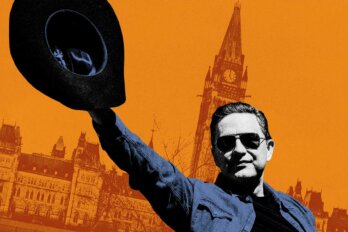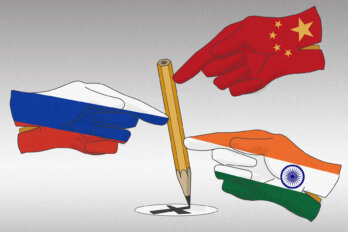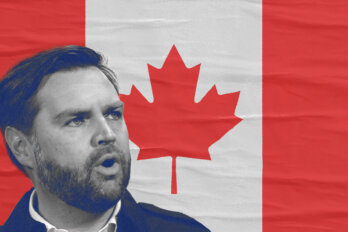Neoliberalism was first born about eight decades ago, a time, not unlike our own, of profound uncertainty and anxiety, when the world was very much in need of new ideas.
It’s the belief in full-throated free market capitalism and the view that “freedom” is society’s highest value and government’s primary role is to ensure “the market’s” flourishing. Amid the post-depression, postwar turmoil, neoliberalism was to be the answer in the postcolonial world to both the failures of laissez-faire capitalism that had delivered the Great Depression and the supposed dangers of the various versions of socialism and social democracy that seemed to be gaining currency. Since then, it has become embedded in the fabric of Canadian government and society and in our background assumptions about how the world works.
That doesn’t mean we necessarily believe the political promises that wealth will trickle down or that the market is self-correcting or that tax cuts will make the economy grow. Rather, even if we don’t particularly like what’s on offer, we’ve come to think that nothing more is possible, that it’s just the way things are. Even when we oppose those policies, we often frame our opposition in ways shaped by decades of neoliberalism.
Politics in these in-between times is very much a battle to shape common sense. As the great cultural theorist Stuart Hall explains, when politicians or others do this, they are doing more than just invoking popular thinking; they are “shaping and influencing it so they can harness it in their favour.” Well-funded right-wing think tanks and an extensive media ecosystem have been hard at work for decades trying to shape our common sense. Schools, universities, libraries—those places where our ideas of the world are shaped—have become a major battleground. Of course, the process is ongoing, never completely successful and never complete, but Hall argues neoliberalism has in fact been remarkably successful in infiltrating our common sense.
Neoliberalism prevailed, he writes, not because its policies were so popular but because it was successful in shaping some of our core ideas about how the world works. The evidence suggests that if we hear something enough times, we internalize it.
Mike Harris was premier of Ontario from 1995 to 2002. In his 1995 campaign, he introduced his neoliberal platform of tax cuts and austerity as “The Common Sense Revolution.” Less government, lower taxes, just common sense. It was enough to win two elections, the second a strong victory. The current leader of the federal Conservatives employs a similar frame and, according to the polls, with considerable success.
When the inevitable consequences of all the cuts and deregulation started to multiply—massive strikes, protests, and a deadly E. coli outbreak as a result of the provincial government’s deregulation of water testing—Harris was forced to resign. The Liberal governments that followed did increase spending to try to fix what had been broken but did so as much as possible without tax increases. Low taxes, still common sense.
Twenty years ago, Harris and Reform Party founder Preston Manning, with the support of the Fraser Institute, released a series of policy documents under the title “Vision for a Canada Strong and Free” that set out with great clarity what neoliberalism in Canada looks like. They began by affirming that “freedom is the supreme value” but argued that three crucial freedoms have been curtailed in Canada: “freedom of choice, freedom of enterprise, and freedom to trade . . .” Canada, they wrote, was adrift. We had strayed far off the path our founders had intended. We had lost our way.
They called for the federal government to vacate the field of social policy and for new approaches that supposedly “enable” Canadians, rather than redistributing wealth and reducing inequality. They called for furthering continentalism and global free trade, for expanding the role of the private sector in delivering public goods and services, and generally for reducing the size and influence of government. Decentralization, deregulation, privatization, low taxes, and continental integration.
Most striking, they described their proposals as driven by neither theory nor ideology; in other words, they presented what they were offering as practical solutions that make good common sense. The documents don’t engage counterarguments or offer evidence or even try moral suasion. No need, just common sense.
I came back to Canada after a few years in Europe in time to watch the political debates before the 2011 election. On TV were four leaders, all male (Elizabeth May, leader of the Green Party, was excluded): Prime Minister Stephen Harper of the Conservatives; Michael Ignatieff, the recently installed Liberal leader; Jack Layton, leader of the social democratic New Democratic Party; and Gilles Duceppe, leader of the Quebec separatist Bloc Québécois.
There were clear differences of emphasis, style, and priorities. But I was struck by how they all seemed to debate within a “fiscal straitjacket.” To his credit, Ignatieff chastised Harper for corporate tax cuts and for proposing new tax cuts for families (but then wondered if Harper would actually ever deliver on those). Harper responded that he had no plans for further corporate tax cuts, and why should he? Further cuts were already built in, and Canada’s corporate taxes were already “winning” the global race to the bottom. Not one of the leaders, however, was saying we had just gone through a terrible decade of extraordinary tax cuts that needed to be reversed. That we were redistributing income upward. That we were starving our health and social programs. Nobody said we needed to fill the $15 billion hole that the goods and services tax cut had created. Nobody was talking about a climate emergency. It all seemed so tame.
Inevitably, the post-debate coverage was on the stage performance of the leaders, on the horse race. On substance, there were clearly differences that matter—Layton did, in fact, run on increasing the corporate tax rate—but differences within a narrow band. Neoliberalism had stunted the political imagination.
One way that neoliberalism has entered our common sense is that it has made us doubt the value or utility of the means we have for achieving big things together. Our collective toolkit has been severely damaged. Governments govern too much, we have been told. They are part of the problem, not part of the solution. Taxes are a burden, a way to punish success, theft. Regulations to protect labour rights, health, safety, and the environment are red tape and an impediment to progress.
Unions harm our competitiveness. Deficits and debt are toxic and a sign that government has grown too big and is using up resources that firms need to compete and consumers need to consume. Inflation means unions have grown too strong and put us in jeopardy of a runaway cycle of wage and price increases. We have created a world in which higher unemployment is seen as a solution.
My son Jordan and I put together some articles for a book called Tax Is Not a Four-Letter Word some years back, and I would sometimes tweet something (before Twitter became the Nazi-infested X) on why it was time to raise taxes to pay for pharmacare or child care or invest in the war against climate change, and inevitably, a few people would do the social media equivalent of an eye roll and ask whether I really believed any politician would be fool enough to propose tax increases and if anybody but me would vote for them if they dared to do so. Pundits called taxes the third rail of politics. What better way to limit the possibilities of collective action than to take tax increases off the table?
“Tax and spend” has become a phrase of derision, as if our streetlights, our roads and highways and bridges, our sewers, our police and soldiers and firefighters, our courts and schools and teachers, the people who keep our food and water and medicines and travel safe, and the help we get when misfortune strikes—and so much more—just somehow happen.
The neoliberal language that portrays the majority as taxpayers rather than, say, citizens or just people subtly divides us, encouraging us to think that we are paying for what some minority, someone other than us, is getting. The hard-working taxpayer versus the welfare queen, the shirker, the undeserving.
When I was doing a bit of a tour for the tax book, I was asked on more than one occasion whether I was pushing for a return to the nanny state, as if state programs designed to protect us when we fall ill or lose our job or are hit by some other misfortune are somehow infantilizing.
“Entitlements,” which in the past simply expressed that citizens have certain economic, social, and cultural rights, had become a word of disparagement. We are not “entitled,” apparently, to anything. The nanny state, we are told, doesn’t prepare people for the harsh reality of market competition. The old entitlements approach makes us weaker and dependent, just as protectionism makes our businesses weaker and lazy. The purpose of the neoliberal state is not to protect its citizens from the vicissitudes of the often-harsh market, so it’s up to each individual to be their own entrepreneur, to build enough value to compete effectively and handle defeat. And anyway, we just can’t afford it.
It’s become a matter of common sense that innovation comes from a free market economy and certainly not from government. On the sidelines of one of the Stockholm meetings of the think tank Progressive Governance Network, a Swedish official questioned what he described as the North American assumption that risk and competition are the best or only source of innovation. Yes, perhaps that’s one way, but we find that security and co-operation is an even better way, he offered. For several of the listeners, the comment simply didn’t compute. Experiments on guaranteed basic income, however, show that people do not work less or perform worse when given security.
More recently, economist Mariana Mazzucato has made a name for herself by taking on the common sense assumption that innovation should be left to entrepreneurs in the market, free from government interference. Quite the contrary, she says. The public sector took the big risks that led to major innovations, and only after the government had done the heavy lifting did private investors have the courage to get in the game. She has the evidence—there would be no Silicon Valley, no iPhone without government innovation—but she’s climbing uphill.
It’s not just what we are repeatedly told about how things work, about the role of government, or about our rights as citizens that shapes our world view. It is in the law and policy-making process, in what public institutions do or don’t do, and in how people experience their institutions that the neoliberal narrative is implanted.
Just about all countries have lived with some level of austerity for several decades. Austerity was part of the neoliberal agenda; cutting both taxes and spending was offered up as a key plank of economic policy. Austerity in Canada was never as deep as what, say, Greece or Spain or even the United Kingdom experienced, but the fiscal straitjacket constrained Canada too.
As services are squeezed and governments shift from universal to targeted programs, many come to view government as less relevant to their lives, there only for others, and they often become angry not just at government but also at those others.
Austerity also undermines the already shallow trust in government. As medicare, the only universal program still standing in Canada, is underfunded and wait times lengthen and out-of-pocket costs grow, the notion that public provision is invariably inefficient is reinforced. Austerity is self-perpetuating. The reluctance to invest what’s needed in public programs means that those programs often disappoint, creating a vicious circle—underfunded programs don’t deliver the services we need, our trust in government’s ability to deliver is undermined, we become even more reluctant to pay the taxes necessary to make those programs better.
What’s on offer is a bargain basement citizenship: don’t ask too much of government, and it won’t ask too much of you. And whatever government does ask of us, we increasingly resent. Austerity, more powerfully than any story people are told, makes evident that they need to look to themselves and away from society and the state. We are taxpayers and consumers who should want to pay as little tax as possible so we can consume as much as possible and make our own choices, free from obligations to the common good. We address societal and global issues, if at all, with individual solutions—give to charity, put a panel on the roof, buy an electric car if we can afford it—but we fight against higher taxes to pay for investments in welfare or renewable energy or infrastructure or better health care or ending chronic homelessness.
An endless stream of reports over the 1980s and ’90s said government needed fixing. Government needed to be more like the private sector and to rely more on the private sector. Too much attention, it was said, had been given to big ideas and not enough to efficient administration and service. Other reports told us there is too much overlap between orders of government, that efficiency and accountability demand that each order stick to its knitting.
In Canada, departments were amalgamated, supersized, making administrative efficiency and “service to customers” the imperative. The role of the deputy minister as “accountability officer” was enshrined in law. Key elements of administration were outsourced. Services were devolved wherever possible, to bring government decision making closer to the customers, or privatized, thereby exposed to the rigours of competition. Policy capacity was reduced. Government agencies that published economic and social research and analysis that could fuel public demands for change were curtailed or eliminated. Internal research units were cut back—so there are fewer new ideas, more short termism, and more dependence on contracting out not just services but also policy.
Furthermore, with greater targeting and the reliance on means testing to determine eligibility for benefits, people seeking help must contend with bureaucratic barriers to prove they need and deserve the help. Rules are imposed that require them to get off the aid they are getting as quickly as possible, and they are closely surveilled to make sure they are following the rules. Programs are designed to send the message that benefits are not entitlements and not a solution for dependency, but rather its cause, and that the recipients are not to be trusted.
In Canada, unemployment insurance became employment insurance with lower benefits, narrower coverage, and more active measures to get people back to work, any work. Income-support programs were designed to break the welfare trap and get recipients to work, any work. And both are rife with rules and procedures and surveillance.
Another report on government, “Top of Mind,” was released in 2022, but it had a different take on what was wrong than all those earlier reports that wanted the public service to act more like the private sector. This report asked senior public service executives at all levels of government what their biggest challenges were. Apparently, what worried executives most was the loss of public trust, the reluctance of senior bureaucrats to give “fearless advice” to their ministers, and the hollowing out of policy capacity and conflicts rather than co-operation among levels of government.
A good deal of punditry has gone around in circles on the question of how someone like Donald Trump could become president and how it is possible that he could do so again. He has been found guilty of criminal offences and liable for having committed sexual abuse. US newspapers have likely lost track of the number of lies he tells, though they were counting for a while. He governed in chaos and with cruelty targeted at his enemies and the most vulnerable. He tried everything to hold onto power and faces numerous charges related to election interference and the attempted insurrection, among numerous other indictments and civil actions.
Perhaps one answer is that all this is part of his appeal, that he is in some ways like the heroes in the “neoliberal stories” we have been told. He is an entrepreneur, filthy rich, or so it seems, a billionaire who took what he wanted, rolled over those who stood in his way, and had contempt for the losers. He could have been written by Ayn Rand, on a bad day.
Trump’s support seems unwavering and remarkably forgiving. Perhaps this reflects another neoliberal story we have been told, that all of life is a competition of winners and losers, that public policy is a zero-sum game, that when others get, we lose. He is also willing to tip the scales on behalf of some in this harsh competition. Trump made no secret of whose side he is on. His support is heavily male, white, and Christian nationalists.
His politics of resentment offers his followers an explanation for what has gone wrong, why they are so unhappy and lonely, and whom they should blame. Immigrants, who are bringing into America new cultures, new ideas, and who are, he repeatedly warns, dangerous and competing for scarce public services, scarce housing, and scarce jobs. Liberals and “the woke,” who are telling them that they have to change, that some of their ideas are racist or sexist or otherwise exclusionary and bigoted, and who have undone traditions and unleashed so much change. Many want all the change to stop because they believe they are on their own to manage it and it seems to be directed right at them. And Trump’s Republicans promise to take them back to a false pastoral, to a past that never was, to make America great again.
They attack the elites—not the rich and powerful but the experts, intellectuals, journalists and bureaucrats, the deep state, all those who had the hubris to think they could plan or design the future and all those who are now easy prey given the mess we are in. They attack government as something foreign. They treat governing as about punishing bad people more than helping anybody, and they and their followers agree on who deserves punishing.
It does seem that we are living in a world that conflates wealth and worth, price and value, a world in which competition trumps co-operation, in which your gain is my loss—and that just doesn’t seem to be working for most people, but it does help us understand the rise of billionaire demagogues.
A number of pundits have argued that Trump represents the end of neoliberalism, but it may be more accurate to say he is peak neoliberalism, the perfect expression of the disdain for democracy, worship at the altar of competitiveness, the economization of everything, life as a zero-sum game of winners and losers and villains and victims. And he builds off the racism and ethnic hierarchies at least implicit in many of the neoliberal stories.
Economist Branko Milanovic argues a Trump regime was possible only because of neoliberalism. He suggests that Trump is the “best student” of neoliberalism, not because he is driven by any ideology but because, for him, winning the office of president made him owner of the company, USA, and as owner, he was entitled to apply the “rules” of business as ruthlessly as he saw fit—the purest expression of the economization of everything. Trump, says Milanovic, shows us neoliberalism without pretence:
Until Trump came to power, the invasion of the political space by economic rules of behaviour was concealed.
There was a pretence that politicians treated people as citizens. The bubble was burst by Trump who, unschooled in the subtleties of democratic dialectics, could not see how anything could be wrong with the application of business rules to politics. Coming from the private sector, and from its most piracy-oriented segment dealing with real estate, gambling, and Miss Universe, he rightly thought—supported by the neoliberal ideology—that the political space is merely an extension of economics. The rules with which he is familiar are the rules of companies: “You are fired!”—a purely hierarchical decision, based on power consecrated by wealth and unchecked by any other consideration.
One might say that what is most astonishing about neoliberalism is that it persists in the face of our loneliness, insecurity, and polarization, that it weathers every crisis and every new pronouncement of its death. It seems to contain within it the seeds of its own perpetuation as it undermines the collective, our tools for fighting back and for fighting for better. And it has given the rich and powerful formidable tools for maintaining the systems that have served them so well. As political theorist Wendy Brown eloquently put it, “Freedom without society destroys the lexicon by which freedom is made democratic, paired with social consciousness, and nested in political equality. It makes liberty a pure instrument of power, shorn of concern for others, the world, or the future.”
As the lines between public and private and between citizen and consumer blur, as government pulls back from our lives, intervenes less and privatizes more, the room for and relevance of democratic engagement, the contestation of ideas, diminishes. If we are to leave the future to the market, there’s not much point in thinking about what kind of world we might build together.
Neoliberalism encourages a short-term, transactional approach to the world. By making government less relevant to our everyday lives, an instrument of control rather than public enterprise, we shouldn’t be surprised if the result is antipathy or apathy or a loss in the belief that we can do great things together or even that we are in this together. We lose interest in political parties, in politics. We vote every once in a while, if we so choose, and otherwise retreat to our private milieux.
We see problems and solutions in individual terms, looking for people to blame for what we don’t like, and believing we are on our own or with our little platoons to deal with what the world throws at us. In this age of insecurity, attachment to democracy declines and vulnerability to demagogues grows.
In the face of polycrisis and after the pandemic, neoliberalism has no doubt lost whatever lustre it may have had, but it has not yet lost its hold even as we search for some alternative to build something better and avoid something much worse.
Adapted and excerpted from Breaking Free of Neoliberalism: Canada’s Challenge by Alex Himelfarb, copyright © 2024 by Alex Himelfarb. Reprinted by permission of Formac Lorimer Books, Inc. All rights reserved.





